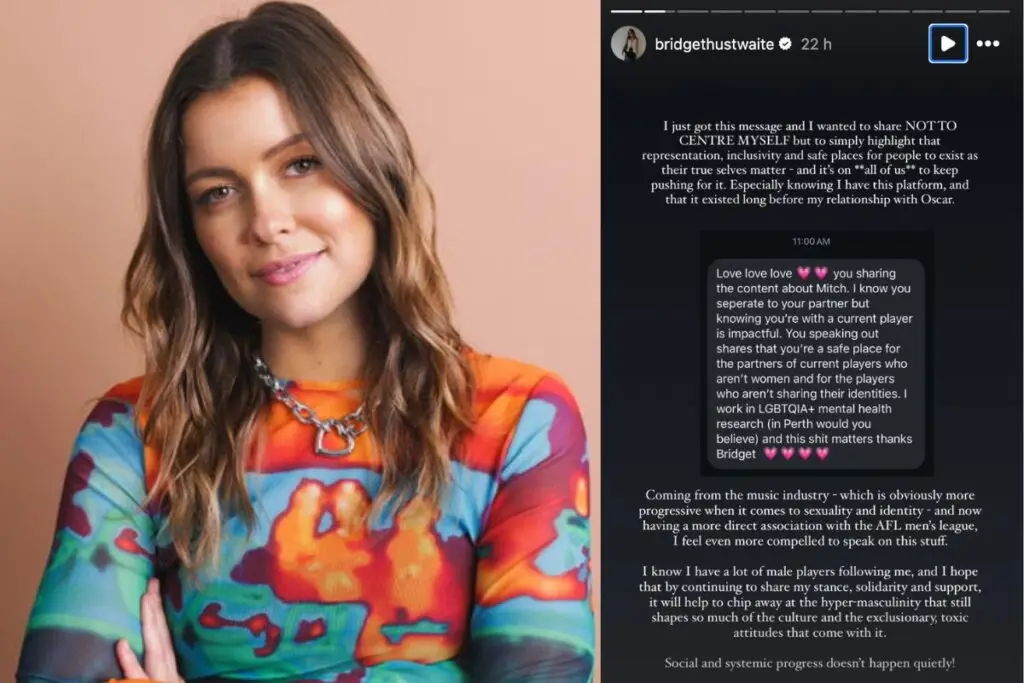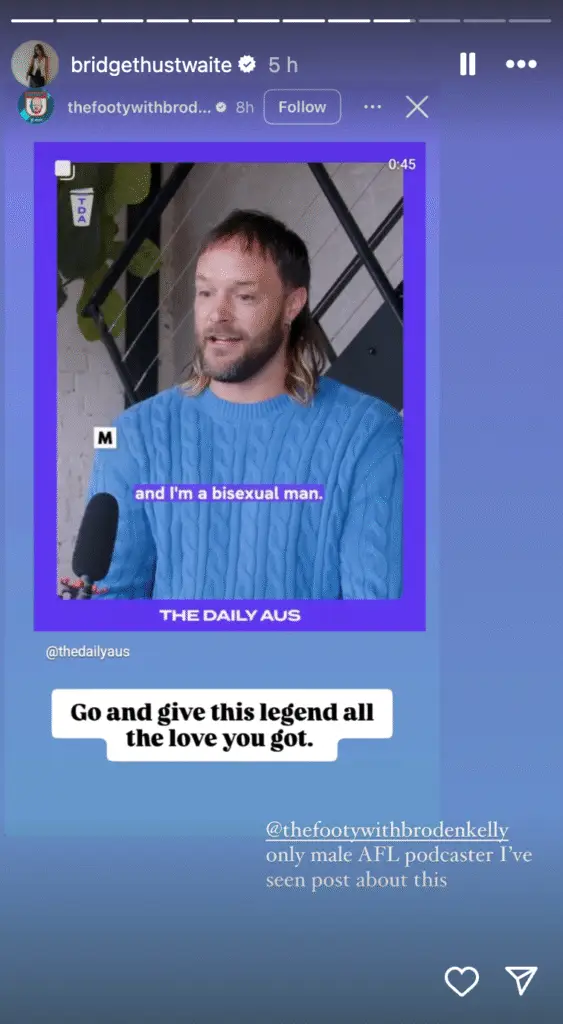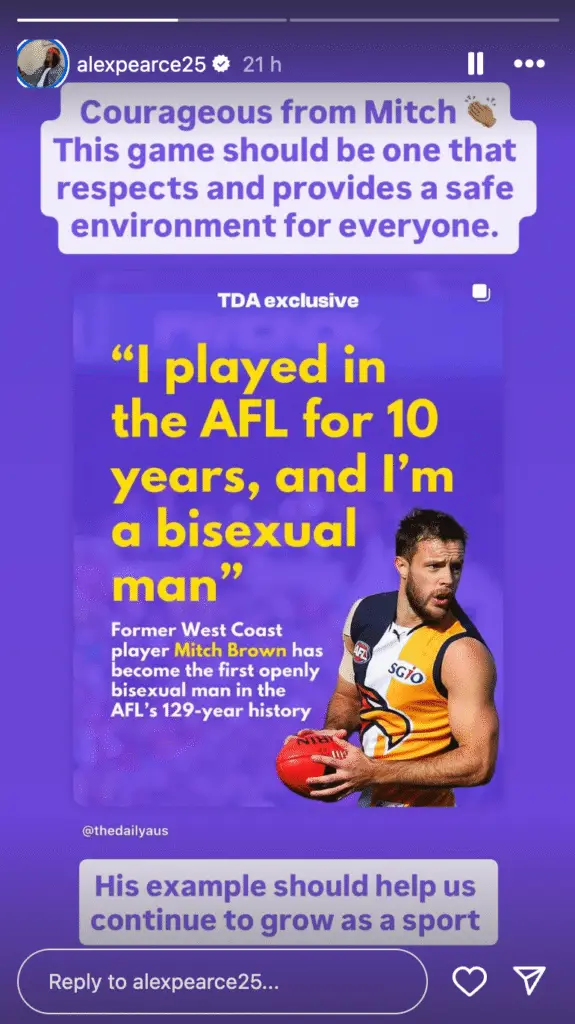When former West Coast Eagles player Mitch Brown came out as bisexual this week, he became the first male who has played at AFL level to do so publicly. It was a powerful, courageous moment. Not only for Brown personally, but for the broader culture of men’s sport in Australia.
But in the 24 hours since (and at the time of writing this), the response from within the AFL community has been telling.
Out of the league’s 18 clubs, only five – West Coast, Western Bulldogs, Port Adelaide, Fremantle, and GWS – shared standalone grid posts on Instagram expressing support. Sydney, Carlton and Geelong reshared a reel of Brown’s exclusive interview with The Daily Aus to their Instagram stories, whilst Hawthorn amplified a post from their LGBTIA+ supporter group, Hawks Pride.
Among the biggest male AFL podcasters and content creators, Dyl and Friends was posting snowboarding adventures, Dan Does Footy was promoting his grand final party and reacting to Gold Coast’s thrashing of Essendon, whilst Kick It Forward were sharing how to avoid paying at a parking complex. None of them posted about Brown’s story. I only saw The Footy with Broden Kelly team urge fans to “Go and give this legend all the love you got”.
From current AFL players, only Fremantle captain Alex Pearce publicly acknowledged the moment, writing on his Instagram story: “This game should be one that respects and provides a safe environment for everyone. His [Mitch’s] example should help us continue to grow as a sport”.
Collingwood captain Darcy Moore, in his capacity as president of the AFL Players Association, also issued a formal statement of support. Meanwhile, former Western Bulldogs player and current ABC Melbourne presenter Bob Murphy shared a photo of Brown on his Instagram grid, along with the caption: “More power to you, Mitch.”
An article reporting on Mitch Brown’s interview with The Daily Aus was published on the official AFL website, and it included a statement from AFL CEO Andrew Dillon, that read: “Today is a step forward, and building on Mitch’s story we hope that others feel encouraged to be their authentic selves and share their own journeys and that these stories are met with support from teammates, clubs and the wider football community.
“The AFL will continue to partner with our clubs, our Pride and Allies groups and the LGBTQI+ community to drive and celebrate inclusion across both our AFL and AFLW competitions,” added Dillon. “Together our commitment is to keep making football an inclusive and welcoming environment for everyone to thrive, and that work never stops.”

It’s a strong and necessary message from the top but still, notably, the AFL did not share the news or the article to their 1.3 million followers on Instagram, where most of their direct engagement with fans occurs.
This lack of wider engagement – particularly on social media – where the league, its players and content creators actively cultivate their brand and fan relationships, reveals a deeper discomfort with queerness in the public face of men’s football. Especially when you consider how active many male players are on social media. They regularly post training shots, game highlights, recovery routines, and personal lifestyle moments. It’s clear they care about building their profiles and connecting with fans. So when it comes to supporting a historic moment like Mitch Brown’s coming out, the deafening silence raises uncomfortable questions: Do they care more about their image than the greater good of the game? Are they willing to post anything that boosts their personal brand, but hesitant when it comes to standing up for inclusion and change?
I’m sure part of the silence also comes down to fear. I’m sure that many male players may want to show support but hesitate to be the first or only one publicly doing so. In a traditionally conservative and hyper-masculine environment like the AFL, being the “only” visible ally risks social isolation or unwanted scrutiny. Without visible leadership and peer support, it’s easier for players to stay silent than to break new ground.
To understand that discomfort, we need to talk about homosociality, a sociological term for same-gender bonding and how gender norms are reinforced through peer relationships.
In the AFL and other hyper-masculine environments, male relationships are deeply valued, but tightly policed by unspoken rules: be stoic, don’t show weakness, and never stray too far from heterosexual norms. Public vulnerability, especially when it involves queerness, can disrupt those norms. Even when players might feel genuine support for someone like Mitch Brown, expressing it openly on a podcast, a post, or even a story can feel risky.
On the other hand, AFLW players have consistently shown openness, vulnerability, and solidarity when it comes to issues of identity and inclusion. Whether it’s celebrating Pride Round or supporting LGBTQIA+ teammates, the women’s competition has always led with emotional authenticity.
This, of course, reflects broader gendered norms. Women, by contrast, are often granted more social permission to express emotional closeness in friendships. Hugging, crying, sharing feelings – these behaviours are encouraged and even expected. But they’re also frequently sexualised under the male gaze, fetishised or dismissed as performative. Still, women can typically show affection and support without facing the same kind of peer suspicion or backlash that men do.

And this is where social media becomes central to the conversation.
Some might argue that “not everything needs to be posted,” or “support doesn’t have to be public”. In another context, that might be fair. But when a player makes history by coming out in a sport still shaped by rigid masculine norms, social media isn’t just decorative, it’s decisive. It’s the primary space where clubs and players connect with fans, shape public culture, and show what the game stands for.
It’s also where homophobic trolling and hate speech thrive. For clubs with large online followings, and the AFL’s official social media accounts, moderating and managing these comments is a known challenge. While these teams may not always have enough staff dedicated to real-time moderation, this issue has been flagged for years, and by now, it should have been properly addressed.
I’m not alone in noticing the silence from various teams and figures in the AFL community. Some of my Instagram followers have shared similar sentiments with me, such as Amelia who wrote: “I’m a queer Crows fan and I’m currently feeling disappointed in my club for not showing public support. I’m feeling unseen and let down, especially given recent events.”
“I’m really disappointed Essendon havent [sic] posted. I think I’ll message them,” shared Kelsey.
Some acknowledged particular teams resharing the original interview on Instagram stories, but felt it wasn’t enough. “Wish the Swans did more than a story but better than nothing I guess,” wrote Alex, while Charlotte said, “Wish Sydney had made a grid post instead of just their stories but happy that they shared their support”.

This is a historic moment that has the capacity to shift culture and change lives. Surely it deserves permanence on one’s grid, rather than a 24-hour story post before vanishing into thin air? By giving it a lasting place, we set a tone and a standard for the future. It becomes not only a symbol of ongoing commitment to the LGBTQIA+ community, but also a reminder to ourselves and others of the values that the AFL choose to uplift.
When clubs and players use their platforms to speak up, they don’t just make a statement, they create safer conditions for fans, players, and future generations. They show that the game is serious about inclusion. But beyond making a statement, we have to show up – publicly and visibly – on social media. We have to show Mitch that it was worth putting himself out there like this. That his courage is seen, valued, and supported by the community he’s helping to change.
Silence, whether intentional or not, creates space for bigotry to breathe.
Brown’s coming out is not just about representation. It’s about challenging the cultural norms that still tell men in sport to keep quiet, to blend in, to suppress parts of themselves to be accepted. He’s opened a door. But for real progress, visibility has to be matched with visible solidarity.
A single post won’t fix a deeply entrenched culture. But in moments like this, it’s a bloody strong start.
Bridget Hustwaite is a bestselling author, radio and television presenter.
Top photo – Pictured: Mitch Brown, Source: YouTube/The Daily Aus

